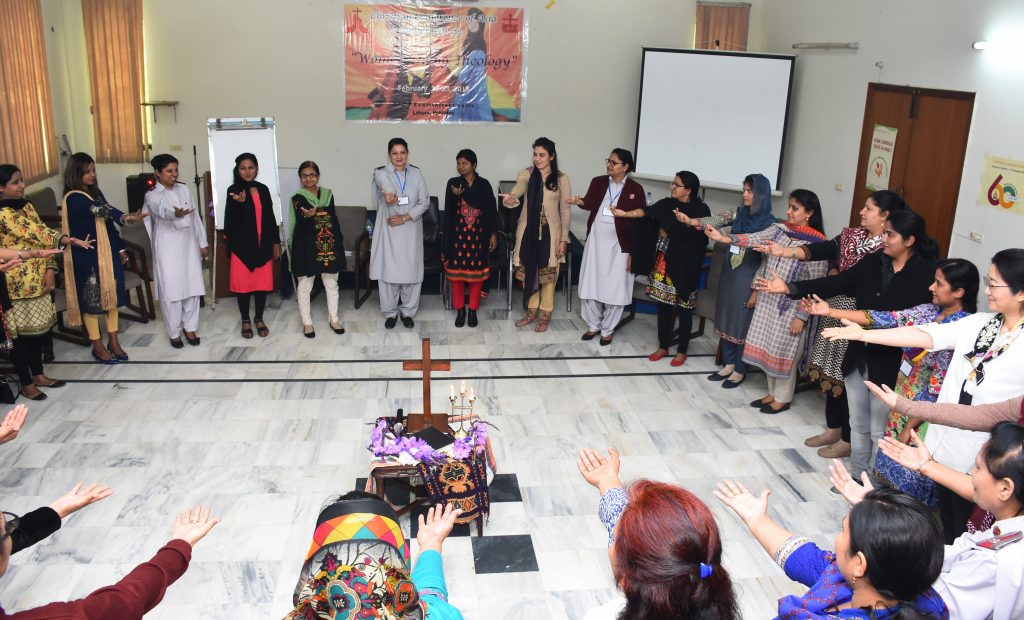Women Theologians affirm, “Equal opportunities are celebration of the gift of togetherness and the life in its fullness”

The participants of the national consultation on ‘Women Doing Theology’ held in Lahore, Pakistan affirmed that “equal opportunities for men and women to participate in mission and witness are occasions to rejoice and celebrate the gift of togetherness and the life in its fullness”.
Organized by the Christian Conference of Asia (CCA), the consultation was was held in Lahore, Pakistan from 21 to 23 February 2018.
This Consultation was attended by thirty three women theologians from various churches, theological institutions and Christian organizations in Pakistan; Salvation Army, Church of Pakistan, Presbyterian Church in Pakistan, the Roman Catholic Church, Gujranwala Theological Seminary, St. Thomas Theological Seminary, Christian Study Center, Open Theological Seminary, Maktaba-e Anaveem Pakistan(MAP) - People’s Forum for Contextual Theology.
While addressing the question on “what it means by ‘doing theology in Asian Context, especially in Pakistan’, the participants echoed their concern that “men and women are equals before God, both bearing the image of God. God calls both men and women to fulfill the roles and responsibilities specially designed for them. However, in all spheres of Asian society, women are being dominated and de-womanized. In the Church and society women are being treated with bias”.
The participants challenged the gender based discriminations in the church and society, and opined that “Biblical and theological exegesis often grant men fuller participation than women in the life of the church, and restrict the role of women to an inferior levels”.
”Women theologians are expected to play a crucial role to nurture the prophetic voice of women at all levels. Doing theology that empowers and liberates women in the Church and society will ensure upholding the dignity and equality of women in the Church and society”, added Pakistan’s women theologians who came together in a common platform through the facilitation of CCA.
Gender based violence against women has its deep roots in a patriarchal social structure of Pakistan. It is important for the churches to address the crucial issues women in Pakistan are facing; and a gender sensitization education is essential in Pakistan’s Church and society”, said Ayra Inderyas of the Church of Pakistan.
Jennifer Jag Jivan in a presentation on ’Empowering Leadership and Recognizing Women’s Strength’ invited the women theologians to meditate on their strength and weakness.
“From the very beginning of church history, women fulfilled a vital role in the churches. Women have passion and warm hearts to listen to other voices and understand others’ needs. Women should strengthen their spirituality in order to develop their talents”, added Jennifer Jag Jivan.
Farhana Nazir, professor at the Gujranwala Theological Seminary in a presentation on ‘Envisioning a Renewed Church in Pakistan’ told the participants to “Be courageous to voice your presence to the people and show your capacity; otherwise nobody would recognize you.”
Bible Study sessions were focused on affirming equality of women intellectually, socially and morally in the contexts of women re-reading the story of Leah, Rachel, Jacob and Christian Family Laws.
Pakistan’s women theologians affirmed that re-reading of the Bible requires them to act for justice and interpret the Bible in a way that affirms the rights and dignity of women, children and all marginalized segments of society.
The consultation was facilitated and coordinated by CCA programme staff Rev. Jung Eun Moon and Sunila Ammar.
Women Doing Theology is one of CCA’s strategic programme priorities to promote a collective effort of study, analysis, and reflection among committed young Asian women theologians to address pertinent Asian issues and contextual theologizing from a feminist perspective.










